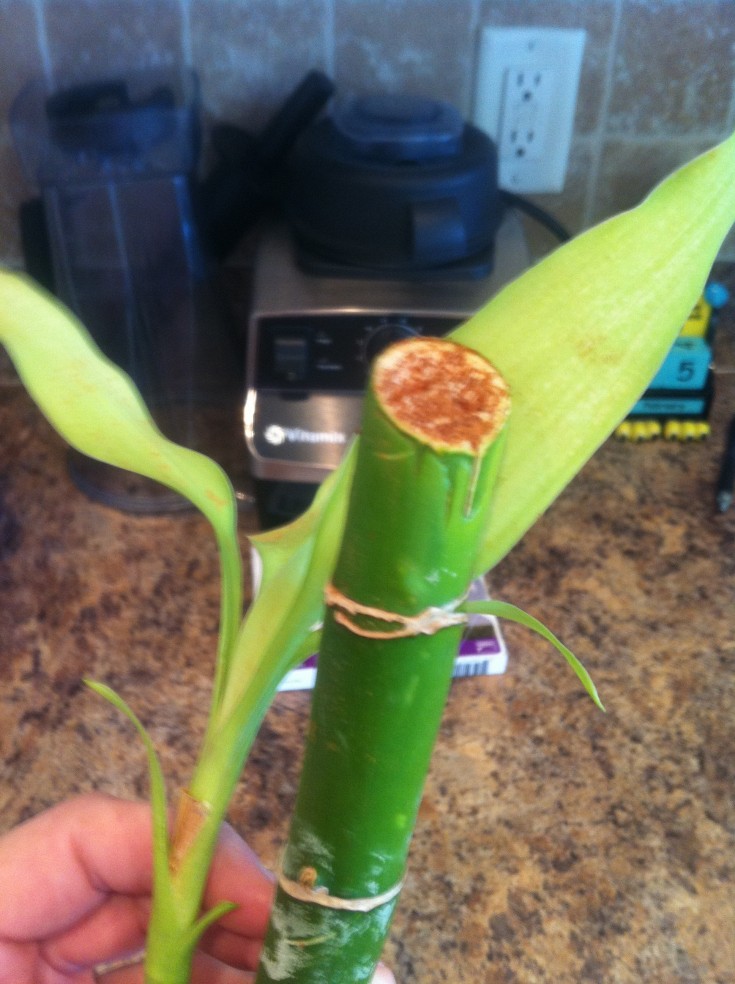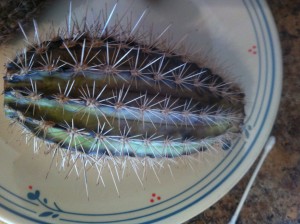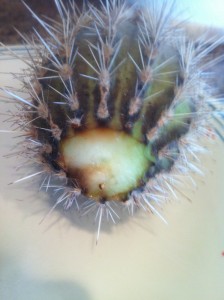Ask the Expert: Ongoing Fight to Save Lucky Bamboo Stalk
“When I was jogging about 4 years ago, I found this Lucky Bamboo stalk on the top of someone’s trash and took him home. He’s always been in a glass vase with water and sat outside in the enclosed patio in south Florida. I’ve never had a problem until a week ago when the top of the stalk became yellow.
I removed him from the water, trimmed back all of the roots, and cut the stalk about a half-inch below where the yellow stopped. I had to repeat the process a week later and then again, today, but this time, I cut it significantly beneath the yellow and quickly applied cinnamon onto the cut. I also submerged the roots in clean water with some hydrogen peroxide. The thing is that there is a smell about him, but It seems to be coming from the middle of the stalk. It he doomed? Will the yellow continue to grow from the top, seemingly out of nowhere? He did grow brand spanking new, white roots in the last few days so that seems healthy.
Here are some photos: The yellow top I cut off today, the new roots, the freshly cut stalk. (Any brown powder is the cinnamon) Thank you SO MUCH for any advice. I really want to save this guy!” – Erika
Plant Expert Reply:
Erika,
Stalk looks fairly healthy. A couple of questions: Is the brown towards the bottom of the stalk cinnamon? Why did you place cinnamon on the cut and do you always cut straight across?
When cutting lucky bamboo or any other plant, you should make the cut at a 45 degree angle. This allows for the plant to heal properly without creating a dieback situation. The straight cut could be part of your problem.
Are you seeing any lesions on the stalk — see the image in this post Lucky Bamboo With Fungus .
I am also concerned about submerging the roots in hydrogen peroxide. How strong was the solution? Lucky bamboo is finicky about fertilizer and can be with other chemicals as well.
Hopefully with a little more information I can help you resolve your issues.
*Normally Ask The Expert conversation go directly to the comment section, but this conversation was such a lively back and forth that the conversation was captured in my email before I could get it to the blog.
Erika’s Reply:
Jamie,
THANK YOU so much for your quick response! Wow, you and your site are great. I’ve been on other forums and they are not as nice or as concerned.
- 1. The cinnamon: I took the stalk to a “Master Gardener” group in town and they suggested applying cinnamon after cutting the stalk to help prevent infection and further yellowing. Does that not work? Maybe it doesn’t. It definitely hides his smell. Ha. Is there something else that might?
- 2. And yes, all the brown is cinnamon on the stalk. I applied it to the top and a small hole on the stalk near the roots.
- 3. I examined the photo you sent of the fungus. I don’t see anything brown or strange-looking like that.
- 4. The first two cuts I performed were straight across. This last one was inadvertently on a 45-degree angle, so that’s good!
- 5. I had read online on a few sites about how a hydrogen peroxide solution can reversed root rot. Maybe it doesn’t work for lucky bamboo. The solution was comprised of 1 1/2 tablespoon HP in 1 1/2 cups of water, so it was fairly diluted. I’m worried now, so I will remove him from that substance.
Should I put him in cactus soil? Or perhaps keep him in water?Again, thank you so much. Going to subscribe to your newsletter and recommend it to my friends. This is a great site and you guys are so kind.Ps. Anybody good with cacti? My 17 year old cactus and the bamboo got sick on the same day.
Erika,
As for the smell, it seemed to mostly come from the middle of the stalk and just a little from the roots. I keep checking the roots, but don’t see any black or dead material – just healthy looking orange and new white ones. He doesn’t smell as bad as he has in the previous days, though. More of a kind of grassy smell.
Updates on the cut: it seems to have dried out okay, however, it looks like, because of that, there seems to be an itty bitty rim around the outside perimeter that is shriveled and dried all the way around with a small, protruding thin indent growing downward from it. I included a picture.Answers to your environmental questions: the cactus is in a pot with two others and they sit near a bunch of potted ultra violets in the front of the house near windows facing north (in south Florida). The bamboo was in a covered patio (mostly outside) facing south.
The water we use is either reverse osmosis or from a pump going to a aquifer whose water comes back clean when we test it.
I haven’t fertilized either of them in a long while. Should I do this? Should I move the bamboo out of water into cactus soil and a well-draining pot?
As for the cactus, like I had indicated, its in a pot with two others that seem perfectly green and healthy. I recently transplanted them into a bigger pot and I can’t help but wonder if I damaged him doing that or buried his roots too deep.
I went to check on him today and discovered that he does, in fact, have root rot. I thought it was on the stem only. I have to somehow remove his root structure from the other two (they have grown together apparently through the years), but before I did that, I tried to cut off two parts of the upper portion of the cactus, hoping that they will callous over and I can reroot them. While he looks pretty bad from the side, the inside didn’t seem to be terrible. I enclosed a picture for your professional opinion.
Jamie, you’re awesome and thank you so much for you time and your questions. I can’t tell you how much I appreciate it.
Erika,

 Find Your
Find Your 







my lucky bamboo has been in a ceramic small pot since I got it years ago. Will changing the pot to a glass vase interfere with its growth?